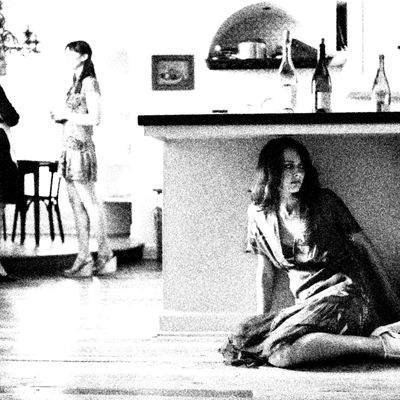
From a Shakespeare lover’s vantage, Joss Whedon’s Much Ado About Nothing arrives from nowhere, or worse than nowhere — Southern California — with an American cast of commoners from commercial television. Can that be why it’s the smoothest and most enjoyable of all Shakespeare comedies on film — because it wasn’t made by a director looking over his or her shoulder for frowning dramaturges or professors itching for a fight? It’s delicious to think so. The lord of the “Whedonverse” — creator of Buffy the Vampire Slayer, Firefly, etc., and director of Marvel’s The Avengers — intuits what theater Brits like Kenneth Branagh and Sirs Peter Hall and Trevor Nunn often miss: that Shakespeare dictates his own close-ups and wide shots. A film director has only to pare away the scenic inessentials and frame and cut according to the dramatic beats — to follow, as it were, the bouncing Bard — and Shakespeare will out. Much Ado makes the leap to the screen in perfect focus.
Perfect silken deep focus, via black-and-white cinematography by Jay Hunter that stylizes everything while belaboring nothing. Whedon sets the play in a modern compound owned by Leonato (Clark Gregg), a business mogul surrounded by young men in crisp suits and ties. But in some ways the setting is neither here nor there. This isn’t an “opened-out” production like Michael Hoffman’s nineteenth-century-Tuscany Midsummer Night’s Dream with its distracting street urchins and matrons kneading dough. Whedon gives us only what’s required for the action, which takes place on the grounds and tiered patio but occasionally in more intimate settings. On the sidelines, Leonato’s colleague Benedick (Alexis Denisof) indulges in tart exchanges with a former object of his affections, Leonato’s quick-witted niece, Beatrice (Amy Acker) — “I would my horse had the speed of your tongue” — as his colleagues smirk at their palpable attraction. In a distant bedroom, the dark-browed bastard Don John (Sean Maher) does the dirty with his follower, Conrade (now a slinky blonde woman played by Riki Lindhome), while brooding on a way to prevent the union of Leonato’s daughter, Hero (Jillian Morgese), and Don John’s rising rival, Claudio (Fran Kranz). In the end, he’ll contrive to make the ingenuous Hero look to be the biggest slut in town.
Whedon stays true to the comic-romantic genre and the play’s silly title, but he doesn’t slight the dark undertones. Much Ado has much to do with the later Othello, in which bumbling cops don’t expose the terrible plot. The seeds of tragedy are here: The characters have a compulsion to test one another’s love and loyalty, with the result that they’re dismayed (or worse) by how easy it is to deceive the eye and cause people to transfer their affections. The masquerades lead to marriage but leave a disquieting aftertaste. The women have it hardest. I’m sure it’s no accident that the creator of Buffy Summers gives special weight to Beatrice’s powerlessness. Her cousin Hero’s name has been sullied, but she may not put a stake in the tormentor’s heart. So her “surrender” to Benedick comes with a command to kill Claudio — another test of love both ludicrous and potentially tragic.
As Beatrice, Acker is a treat—lyrically brittle, her features so vivid that her eyes send out beams even in black and white. Denisof is frankly outmatched, but there’s something admirably sensible in this Benedick’s wariness. Walking away is his best weapon. The whole cast makes Shakespeare’s language sound as if they speak it every day. Gregg (the hapless agent from The Avengers) is fine-tempered in a difficult, unshowy role, and Maher gives Don John a radiant creepiness. But the movie’s singular acting triumph is Nathan Fillion’s Constable Dogberry, one of Shakespeare’s simpler buffoons made poetic by understatement. Fillion speaks softly, with uninflected sincerity, a brilliant departure from the standard gregarious-hambone Dogberry. It’s his insularity — his imperviousness to the interjections of more observant people—that makes him such a touchingly credible clown.
I’m sure that academics will have objections, although Whedon has stood up to far worse than the Shakespeare (or Earl of Oxford) mob. He has been to Comic-Con. I’d be pressed to imagine a more sure-footed Much Ado. When Shakespeare’s done right, you can’t imagine him ever being done wrong. The clarity is blinding.
This review originally ran in the June 3, 2013 issue of New York magazine.


